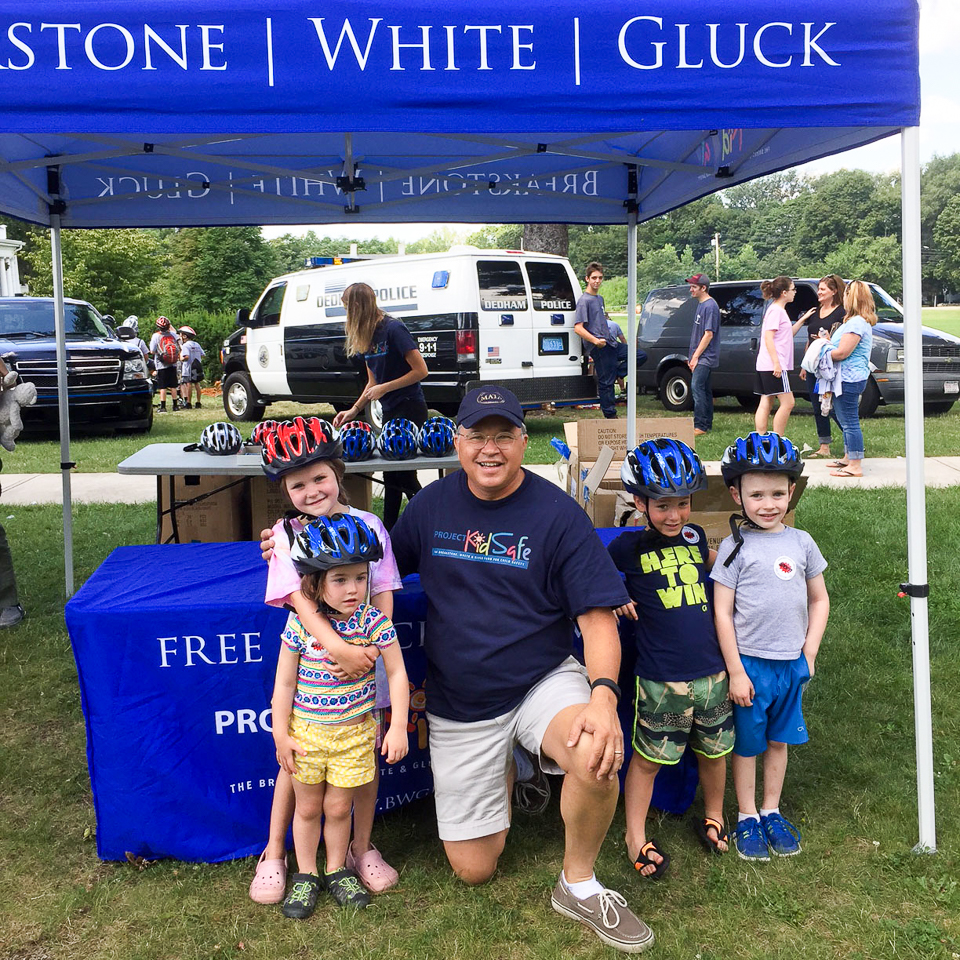Posts Tagged ‘Boston’
Project KidSafe Bike Helmet Donations: Dedham Bike Rodeo, Mattapan on Wheels and Windsor Street Care Center in Cambridge
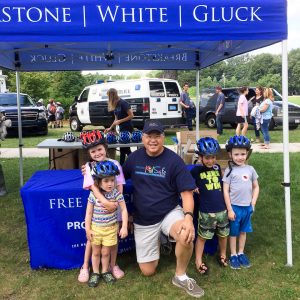 We want to share a few photos from our Project KidSafe campaign.
We want to share a few photos from our Project KidSafe campaign.
Dedham Bike Rodeo. Breakstone, White & Gluck was pleased to donate 120 Project KidSafe bike helmets to the Dedham Bike Rodeo on July 26. Attorney David W. White participated in the event, fitting helmets for children who needed one. We always enjoy this event because we get a chance to talk to children and parents about bike helmets and bike safety. It was one of the first events we donated helmets to in 2013, the year we began our Project KidSafe campaign. The rodeo is organized by the Dedham Police Department and the Dedham Parks and Recreation Department.
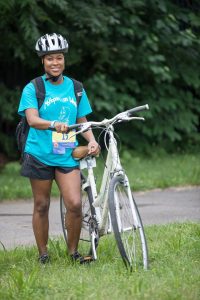
Mattapan on Wheels. Breakstone, White & Gluck also donated helmets to cyclists at the 7th Annual Mattapan on Wheels event on July 22. We are told 130 cyclists took to the Neponset Trail to raise funds for a youth bike summit and many had no helmet or needed a new one. Participants could choose their destination and ride along the trail to Pope John Paul II Park, Carson Beach or Castle Island. This was the first time we donated helmets to this event and we are told every helmet was put to use.
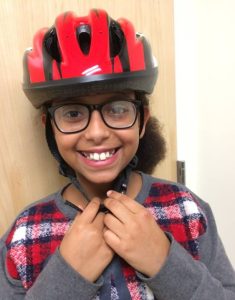
Windsor Street Care Center. Breakstone, White & Gluck also donated 150 bike helmets to the Windsor Street Care Center, which is part of the Cambridge Healthcare Alliance. The medical staff have been giving helmets away throughout the summer to children who need one. This is the third year we have made this donation.
About Breakstone, White & Gluck and our Project KidSafe Campaign
Breakstone, White & Gluck is proud to support cyclists through our Project KidSafe campaign. Since 2013, our attorneys have donated over 10,000 bicycle helmets to children in Boston and across Massachusetts. Our goal is to encourage children to wear helmets every time they ride to prevent head injuries on bicycles. To learn more about our campaign, visit www.bwglaw.com/project-kidsafe/.
Photo Credits:
- Mattapan on Wheels: Photo taken by Donrick Pond. Courtesy of Mattapan Food and Fitness Coalition Vigorous Youth Facebook page.
- Windsor Street Care Center, Cambridge Health Alliance Facebook page.
Breakstone, White & Gluck and Boston Police Team Up to Give Bike Helmets to Kids
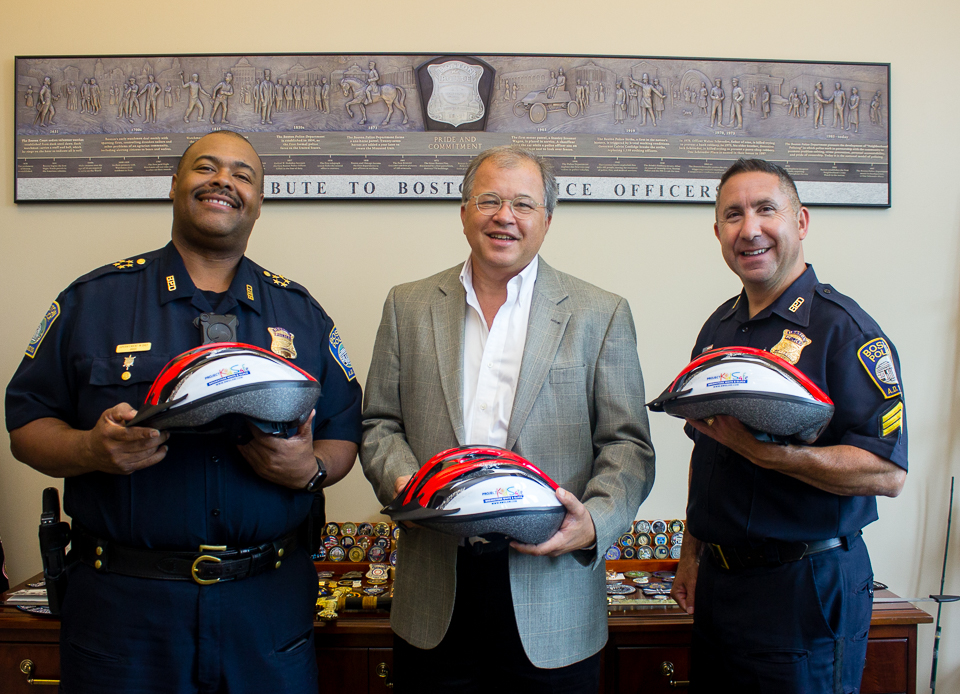
Attorney David W. White (center) with William G. Gross, Superintendent-in-Chief of the Boston Police Department (left) and Sgt. Gino Provenzano (right) of the Boston Police Department. Breakstone, White & Gluck was pleased to donate 200 bike helmets to the Boston Police Department this summer to help kids ride safely.
Breakstone, White & Gluck and our Project KidSafe campaign are proud to partner with the Boston Police Department to keep children safe on bikes.
Our attorneys recently donated 200 brand-new bicycle helmets to the Boston Police Department. Over the summer, officers will give helmets away to children who need one as part of the department’s community policing efforts. So far, officers have put new helmets on children at the Villa Victoria Bicycle Safety Day, the Dorchester/C-11 Bike Rodeo and at the Condon Community Center in South Boston. These events are meaningful because kids get more than a new helmet. They get the opportunity to learn about bike safety and meet a police officer in their own neighborhood in a fun, relaxed setting, building trust and community relationships while learning how to ride safely and protect themselves from head injuries.
Breakstone, White & Gluck thanks the Boston Police Department for helping us for a second year. Attorney David W. White shared a nice visit with Superintendent-in-Chief William G. Gross and Sgt. Gino Provenzano at Boston Police Headquarters this week. They talked about bike safety and the department’s community policing work for kids across Boston. What tremendous work they do! By the way, Boston Police have their neighborhood flashlight walks starting up again.
See photos from some of the bike helmet giveaways on the Boston Police Department website.
About Project KidSafe
Breakstone, White & Gluck is committed to protecting cyclists of all ages and preventing head injuries. Through our Project KidSafe campaign, we have donated over 10,000 bicycle helmets to children in Boston, Cambridge and other communities since 2013. We have partnered with over 40 police departments, bicycle committees, community organizations and schools who are committed to keeping children safe.
About Breakstone, White & Gluck
With over 100 years combined experience, the attorneys of Breakstone, White & Gluck fight for justice for those who have been injured by negligence and wrongdoing of others. If you have been injured, contact us for a free legal consultation at 800-379-1244 or 617-723-7676 or use our contact form.
Project KidSafe: Bicycle Helmet Donations for Norwood Police and Bikes Not Bombs
As we continue our 2017 Project KidSafe campaign, Breakstone, White & Gluck wants to share a few recent bike helmet donations and some bicycle safety tips for children over the Memorial Day weekend.
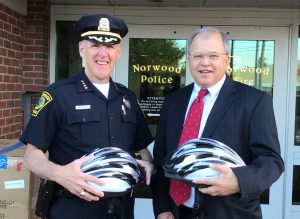 Breakstone, White & Gluck was pleased to donate 100 bicycle helmets to the Norwood Police Department for the third year. Attorney David W. White delivered the helmets to Norwood Police Chief William G. Brooks III in early May. The Norwood Police Department now plans to distribute the helmets at a bike safety event being planned for June. If you live in Norwood, watch local community calendars.
Breakstone, White & Gluck was pleased to donate 100 bicycle helmets to the Norwood Police Department for the third year. Attorney David W. White delivered the helmets to Norwood Police Chief William G. Brooks III in early May. The Norwood Police Department now plans to distribute the helmets at a bike safety event being planned for June. If you live in Norwood, watch local community calendars.
It was also our pleasure to donate 170 bicycle helmets to Bikes Not Bombs in Jamaica Plain. Founded in 1984, Bikes Not Bombs works to repair used bikes locally and internationally to help individuals. This was the fifth year we have made this donation.
In Boston, Bikes Not Bombs offers a popular Earn-A-Bike program, which teaches children and teenagers how to ride in the city and repair bikes during a six-week session. Students are taken on group rides and get to help refurbish a bike to take home. Each graduate also takes home a new bicycle helmet from our Project KidSafe campaign.
In addition to Earn-A-Bike, Bikes Not Bombs offers other programs for teenagers in the Boston area, aimed at helping them learn safe cycling skills and bike repair. These programs include Girls in Action and BOCA, a program which combines cycling and community action.
You may see a Bikes Not Bombs tent at local community events this Spring and Summer. The organization collects and rehabs bikes for people without access to transportation in Africa, Latin America and Caribbean. Bicycles provide a means of transportation and help individuals fight political oppression and rebuild communities. If you have an extra bike, consider making a donation. Learn more on the Bikes Not Bombs website.
Through our Project KidSafe campaign, Breakstone, White & Gluck has donated over 10,000 bicycle helmets to children in the Boston area since 2013. During the fifth year of our campaign, our goal continues to be to encourage children to wear a helmet every time they ride.
Study after study has shown wearing a helmet is the most effective way to protect you or your child from a head injury if you fall or are in a bicycle accident. Yet studies also show children are not always wearing helmets, even though many states have laws requiring helmet use for children. In Massachusetts, the law says children who are 16 years old and younger must wear helmets.
Earlier this month, the Today Show reported more than 400,000 kids are hurt each year while riding bikes, scooters, skateboards and skates or roller blades. Of the children injured on bikes, only 68 percent were wearing bike helmets, according to their parents.
As we approach the Memorial Day weekend, here are some reminders for helping young cyclists ride safe:
- Wear a bicycle helmet. Select a helmet for your child which meets the Consumer Product Safety Commission standard. Properly adjust it so it has a snug fit and will provide protection in case of a fall or a bicycle accident. If you need help, there is an instructional video on our website. Then, tell your child it is important to wear a helmet every time they ride. Be sure to wear your helmet, too. These last two steps are the most important.
- Wear neon and bright colors. Stock your child’s drawers up with neon t-shirts and other clothing. You want to help your child stand out to traffic, pedestrians and other cyclists. Search “neon clothing” on Amazon.com for ideas.
- Ride with your children. Enjoy cycling with your children and teach them safe riding techniques at the same time.
- Control your bicycle. Keep both hands on your handlebars and tell your child to do the same. Keep school backpacks light or use a bike basket. Encourage children to always look ahead and not turn around to talk to you or other cyclists while pedaling.
- No cell phone use. Do not let your child ride with their cell phone. If they must, make sure it is packed away in a backpack and turned off. Cell phone use is likely to lead to a bicycle accident.
- Check equipment. Before they ride, check your child’s bike. Make sure tires are properly inflated and that the brakes work.
- Avoid riding at night. Children should not ride at night until they are older and have more experience on the roads. If you ride at night, be aware that you are required to use lights and reflectors under Massachusetts law.
Slow Down! Boston, Cambridge and Other Cities Have Dropped Speeds to 25 MPH
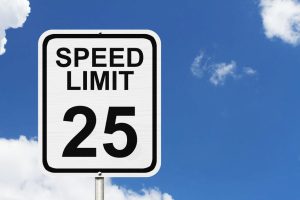 Over the past year, Boston, Cambridge and several other communities have lowered default speed limits from 30 to 25 mph, with a goal of creating safer streets for pedestrians and cyclists. Now it is Quincy’s turn.
Over the past year, Boston, Cambridge and several other communities have lowered default speed limits from 30 to 25 mph, with a goal of creating safer streets for pedestrians and cyclists. Now it is Quincy’s turn.
Last week, the Quincy City Council passed a measure establishing a speed limit of 25 mph, unless another speed limit is posted. The previous speed limit had been 30 mph. Once Mayor Thomas P. Koch signs the new law, officials will decide on an effective date.
In January 2017, the City of Boston dropped its default speed limit from 30 to 25 mph.
Lowering the speed limit was a key part of the Vision Zero Boston campaign, which was launched by Mayor Marty Walsh in 2015. The goal is to end traffic deaths and serious injuries in the City of Boston by 2030, through a combination of efforts, such as reducing speeds, eliminating distracted driving, and improving infrastructure for safer riding, walking and cycling.
While lowering speed limits was a critical step, the City of Boston was unable to act right away.
First, the city had to obtain approval from the state Legislature and Gov. Charlie Baker. Baker signed the Municipal Modernized bill in August 2016, which gave Boston, as well as cities and towns across the state, authority to reduce the default speed limit on local roads.
So far, these communities have reduced speed limits:
- Boston
- Cambridge
- Somerville
- Arlington
- Newton
- Randolph
- Scituate
- Quincy (approved by City Council)
Source: The Boston Globe.
Benefits to Slower Speed Limits
There is strong evidence that slower traffic means safer streets. An excellent example is New York City. In 2014, the city lowered speed limits to 25 mph on 90 percent of its streets. Over three years, traffic fatalities have decreased 23 percent and fell to the lowest number in the city’s history in 2016.
Boston city officials say that when crashes happen, faster vehicles are likely to cause the most serious injuries and fatalities. According to the City of Boston website, at 20 mph, there is a 17 percent likelihood that someone will be seriously injured or killed. At 40 mph, there is a 79 percent likelihood. Slower vehicles can be stopped more quickly, and the slower speeds allow for longer reaction times.
Read More
After Food Poisoning Scare at Chicken & Rice Guys, Do You Know Your Rights When Dining Out?
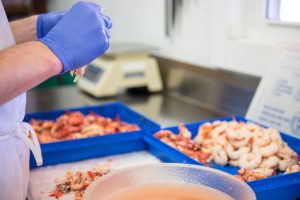
Improper food preparation is one source of food poisoning.
Chicken & Rice Guys shutdown restaurants and food trucks in Boston and Medford earlier this month for more than a week, after 14 people became ill with E. coli. Ten people had to be hospitalized. Given the widespread food poisoning outbreak, it is likely that there will be liability claims against Chicken & Rice Guys for the poisonings.
According to The Boston Globe, the illness was caused by the Shiga toxin-producing Escherichia coli 0157:H7, the most common strain of E. coli in the United States. The Mayo Clinic reports a person can contract this type of E. coli through:
- Exposure to contaminated food, such as raw vegetables or undercooked ground beef
- Contact with an infected person
- Exposure to food which has not been properly handled
Symptoms typically occur within three or four days and can include severe abdominal cramps, diarrhea, vomiting and nausea. Younger children and older adults are the most vulnerable. In some cases, kidney failure can develop and be fatal.
According to news reports, the City of Boston Inspectional Services gave Chicken & Rice Guys approval to re-open its Boston restaurants. The Medford location is also back in business, but the five local food trucks remain closed.
Boston Food Poisoning Cases
Unfortunately, food poisoning is quite common. Each year, 1 in 6 Americans become sick after consuming contaminated food, according to the Centers for Disease Control and Prevention
When restaurants and food trucks are the cause, food poisoning can spread quickly. Remember the Boston College outbreak of 2015? More than 130 students fell ill after eating at the Chipotle Mexican Grille Restaurant in Cleveland Circle. The contamination was initially believed to be E. coli, because the Chipotle chain was in the middle of a nationwide E. coli food poisoning outbreak, which ultimately sickened 60 people in 14 states.
As it turned out, the Boston College students were suffering from norovirus. At least one student filed a lawsuit against the local Chipotle’s.
Your Legal Rights at Restaurants
Diners have rights when eating out. Restaurants and food trucks must follow health regulations set by their local community and the Commonwealth of Massachusetts. The most basic regulations include:
- Employees must wash their hands before handling food
- Meat should be cooked to the proper temperature.
- The restaurant should be kept clean.
If you see a restaurant violating a health regulation, you can alert the staff or ask to speak to the manager. You can also report it to the city’s local health department.
The City of Boston is now offering a great resource for consumers: a letter-grade system for Boston restaurants. Consumers can search the grades online. At some point, restaurants will be required to post grades on storefronts or face fines of $300 per day.
If You Suffer Food Poisoning, Contact a Boston Personal Injury Lawyer
If you suffer food poisoning after eating at a restaurant, you may be entitled to file a claim for negligence and obtain financial compensation. Contact the lawyers of Breakstone, White & Gluck in Boston to help you investigate, determine if you have a case and identify who may be liable for your injuries. There are several parties who may be responsible, including the restaurant, food truck, food distributors and food manufacturers.
For a free legal consultation, contact Breakstone, White & Gluck at 617-723-7676 or 800-379-1244 or use our contact form.
Attorney David W. White Interviewed About Future of Civil Lawsuits Following Aaron Hernandez Suicide
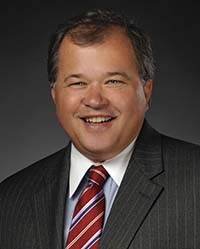 The Metro news website interviewed Attorney David W. White and other legal experts in the wake of Aaron Hernandez’ suicide at Souza Baranowski Correctional Center in Shirley, Massachusetts this week. Hernandez, a former New England Patriot who once received a $40 million contract extension for five years, had been serving a life sentence in the 2013 murder of Odin Lloyd. As prosecutors prepared the Odin Lloyd case, they also charged Hernandez with a double murder in Boston in 2012. Hernandez was acquitted on the Boston murder charges just last week in Suffolk Superior Court. As he headed back to prison, his lawyer spoke about hopes for appealing the Odin Lloyd conviction and seeing Hernandez walk free someday.
The Metro news website interviewed Attorney David W. White and other legal experts in the wake of Aaron Hernandez’ suicide at Souza Baranowski Correctional Center in Shirley, Massachusetts this week. Hernandez, a former New England Patriot who once received a $40 million contract extension for five years, had been serving a life sentence in the 2013 murder of Odin Lloyd. As prosecutors prepared the Odin Lloyd case, they also charged Hernandez with a double murder in Boston in 2012. Hernandez was acquitted on the Boston murder charges just last week in Suffolk Superior Court. As he headed back to prison, his lawyer spoke about hopes for appealing the Odin Lloyd conviction and seeing Hernandez walk free someday.
But Hernandez apparently had no plans for appeal. Come Wednesday morning, he was found hanging from a bed sheet in his cell at the Shirley prison. The state medical examiner concluded the cause of death was suicide by asphyxia from hanging. The football player’s brain will be sent to Boston University researchers who are studying CTE, or Chronic Traumatic Encephalopathy, a progressive degenerative disease of the brain which can only be diagnosed after death. It has been found in other football players.
The suicide changes everything for Odin Lloyd’s family, who was pursuing a wrongful death lawsuit against Hernandez.
During a 2015 trial, Hernandez had been convicted of the first degree murder of Lloyd. Hernandez had an automatic right to appeal to the state’s highest court, the Supreme Judicial Court, but had not completed that appeal. Massachusetts follows a legal doctrine known as abatement ab inito. If someone dies after a conviction but before their appeal is complete, the person’s legal records and convictions are null and void.
“Now that the conviction will be vacated, the family of Odin Lloyd has lost their collateral estoppel claim and they will have to start from scratch to prove he is guilty,” White said in the Metro interview.
Hernandez appeared to have a bright future with the Patriots, then came June 26, 2013. Police arrested him at his North Attleborough home in connection with the murder of Odin Lloyd, a semi-professional football player who had been dating the sister of Hernandez’ fiancee. Less than two hours later, Hernandez was released by the New England Patriots, who had signed him to the $40 million five-year contract extension the previous summer. The contract included a $12.5 million signing bonus. On August 27, 2012, The Boston Globe predicted, “The Patriots are going to have the tight end of duo of Rob Gronkowski and Aaron Hernandez at least through the 2018 season.”
Can the City of Boston Be Held Liable for Self-Driving Accidents? Attorney Marc Breakstone Interviewed as Legal Expert for Boston Herald Article
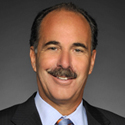 Attorney Marc L. Breakstone was quoted as a legal expert in a Boston Herald article titled “In Driver’s Seat With Insurance” (March 31, 2017). NuTonomy, the self-driving car company now testing its hands-free technology in Boston, has taken out a $5 million insurance policy to guard against lawsuits. Earlier this month, a self-driving Uber vehicle was involved in a car accident in Tempe, Arizona. Police found the Uber vehicle was traveling at 38 mph, below the speed limit, when the collision occurred and was not at fault. While there were no serious injuries, the accident has raised concerns.
Attorney Marc L. Breakstone was quoted as a legal expert in a Boston Herald article titled “In Driver’s Seat With Insurance” (March 31, 2017). NuTonomy, the self-driving car company now testing its hands-free technology in Boston, has taken out a $5 million insurance policy to guard against lawsuits. Earlier this month, a self-driving Uber vehicle was involved in a car accident in Tempe, Arizona. Police found the Uber vehicle was traveling at 38 mph, below the speed limit, when the collision occurred and was not at fault. While there were no serious injuries, the accident has raised concerns.
Attorney Breakstone was asked whether the City of Boston could be held liable if there is an accident involving NuTonomy. He said no, but read his full answer.
Attorney Reza Breakstone has written on the topic of self-driving cars and the legal questions they raise. In 2016, he co-wrote an article titled, “The Self Driving Car: Science Fiction Becomes Reality, Creating a Legal Quandary,” for The Litigator, the official publication of the Capital City Trial Lawyers Association in Sacramento, California.
For Massachusetts Motorcyclists, It’s Time for A Pre-Season Safety Check
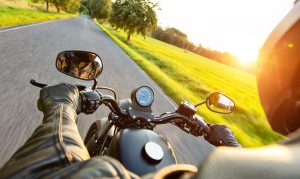 Motorcycle season is almost here. For riders, this means goodbye snow and cold; hello to the open road.
Motorcycle season is almost here. For riders, this means goodbye snow and cold; hello to the open road.
Good pre-season preparation is essential for motorcyclists. Take some time to inspect your motorcycle and helmet and review the Massachusetts driving manual. Review your auto insurance as well; most drivers and motorcyclists do not carry enough insurance.
Wear a Helmet. Under Massachusetts law, motorcyclists must wear helmets which have been approved by the U.S. Department of Transportation (DOT). Helmets save lives so make sure yours is in good condition. If you have been involved in a motorcycle accident or fall, replace your helmet.
Clothing and Gear. Select the appropriate clothing and gloves for driving conditions.
Licensing and Insurance. Class M licenses are required for Massachusetts motorcyclists. Anyone who is 16 or older may take the Class M exam, unless the Registry of Motor Vehicles (RMV) has taken away your right to operate.
Once you pass the exam, you must obtain auto insurance for your motorcycle. It pays to do your homework here. Under the law, Massachusetts motorcyclists are only required to purchase compulsory insurance. But you can and should also purchase optional coverage for more protection.
We encourage you to ask your insurance agent about insurance laws for motorcycles and about coverage for accidents involving underinsured and uninsured drivers. If you are ever injured and the driver responsible does not have adequate insurance, you may have to look to your own insurance policy to fill in the gap and pay some of your medical bills and other compensation.
Insurance companies do not provide for Personal Injury Protection (no-fault benefits) on motorcycle policies. We strongly recommend that you purchase Medical Payments coverage. That coverage will provide insurance for you and your passenger in the event of an accident.
Follow the Rules of the Road. Massachusetts motorcyclists must follow the same rules as other drivers, but there are some differences. If you have questions, you can quickly check the Massachusetts Motorcycle Manual online.
Defensive Driving. One topic covered in the manual is defensive driving. Commit to keeping a safe distance between you and other vehicles on the roads to avoid a motorcycle accident.
Motorcycle Accident Statistics
- Nearly 5,000 people died in motorcycle accidents in 2015, up 8 percent from 2014, according to the National Highway Traffic Safety Administration (NHTSA). In 2015, 88,000 motorcyclists were injured.
- Motorcycle deaths occurred 27 times more frequently than other fatalities on the road, according to NHTSA figures.
About Breakstone, White & Gluck
The lawyers at Breakstone, White & Gluck of Boston have over 100 years combined experience representing motorcyclists who have been seriously injured by the negligence of drivers. Our attorneys have recently negotiated settlements of $3.75 million, $3.5 million and $1.25 million for injured motorcyclists. Read more about our motorcycle accident case results.
After Child’s Death, Another Safety Warning: Keep Hoverboards Out of Your Home and Away From Your Loved Ones
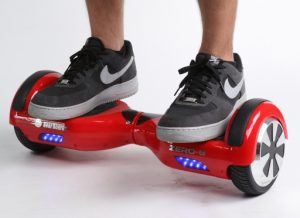 We saw the worst that can happen last week in Harrisburg, PA when a hoverboard caught on fire in a family’s home, claiming the life of a three-year-old child.
We saw the worst that can happen last week in Harrisburg, PA when a hoverboard caught on fire in a family’s home, claiming the life of a three-year-old child.
The hoverboard reportedly ignited while charging, destroying the home. The three-year-old girl died at a local hospital and two other girls were left in critical condition. The girl’s father and a teenage boy were treated for smoke inhalation.
This tragedy was compounded by another death; a local firefighter was reportedly killed in a motor vehicle accident while driving to the fire, the victim of an alleged drunk driver who now faces charges.
This is the first hoverboard fire to claim a life, though we have heard plenty about the product’s dangers. The hoverboard is a self-balancing electric scooter with no handlebars. You may anticipate injuries such as falls and broken bones. But the greater risk lies with the explosive lithium-ion battery packs, which have caused massive fire damage and now a child’s death.
Airlines, Retailers and the Federal Government
Airlines, retailers and the federal government have all taken action against hoverboards.
In December 2015, several major airlines banned hoverboards, dashing the hopes of last-minute holiday shoppers who wanted the cool new toy celebrities were riding all over social media. The airlines said the lithium-ion batteries could cause a fire onboard, and manufacturers were not providing consistent information on the size and power of batteries.
Over the next few months, hoverboards ignited and burned two homes to the ground, including one in Nashville. As her father watched, a teenager was forced to jump from an upstairs window.
Shortly thereafter, Amazon and Best Buy stopped hoverboard sales (at least temporarily). By July 2016, half a million hoverboards were recalled. Amazon was then named as a defendant in a $30 million lawsuit for selling the hoverboard responsible for the Nashville blaze. As the seller of the allegedly defective hoverboard, a retailer may be found liable for selling a defective product under most state product liability laws.
Hoverboard Recall
The July 2016 recall covered hoverboards from 10 manufacturers, all made in China. Consumers were urged to stop using the products immediately and return them. Check online to see if you have a recalled hoverboard.
According to a Consumer Product Safety Commission (CPSC) spokesman, the agency has investigated more than 60 hoverboard fires since Fall 2015. Massachusetts has seen several hoverboard home fires, including in Chelmsford and Somerville, according to The Boston Globe.
For all the dangers, hoverboards are still being sold. In 2016, the CPSC worked with UL, a global product safety testing organization, to develop new standards for hoverboards. Time will tell if the new generation is any safer. For now, hoverboards are a product to keep out of your home and far away from your family. Please share our blog with anyone who has a hoverboard or wants to buy one.
Results for Clients in Product Liability Claims
Free Legal Consultation 800-379-1244
 Read about Attorney David W. White’s $1.15 million product liability award for his client who was seriously injured by defective fitness equipment.
Read about Attorney David W. White’s $1.15 million product liability award for his client who was seriously injured by defective fitness equipment.
With over 100 years combined experience in product liability cases, the attorneys of Breakstone, White & Gluck have obtained numerous awards for clients injured by defective products. Our attorneys are known throughout New England for our results in these cases and have been consistently recognized as Top 100 New England Super Lawyers and Top 100 Massachusetts Super Lawyers.
Safety Checklist: Check Your Baby Strollers and Other Children’s Products Before Spring
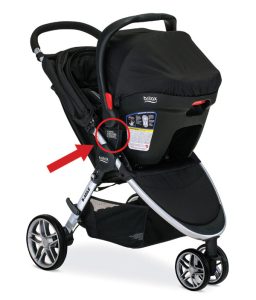 As Spring approaches, parents will be reaching for outdoor toys and children’s equipment. Baby strollers are one of the first products to come out.
As Spring approaches, parents will be reaching for outdoor toys and children’s equipment. Baby strollers are one of the first products to come out.
Before you use a stroller, check for loose or worn parts. Then find out if the stroller has been subject to a product recall or caused injury. You can check online now on the Consumer Product Safety Commission website.
Baby Stroller Recalls. We started with baby strollers because there have been several baby strollers recalled in the past year, including Britax, Aria Child and Phil & Teds strollers. Britax has actually issued two sets of recalls over the past 15 months, one for 60,000 strollers in January 2016 and another for more than 700,000 strollers in February 2017.
In December 2016, Aria Child recalled 29,000 strollers, instructing consumers to stop using the products and contact the company for a free replacement. Five consumers were pinched by the hinge mechanism of the $180 stroller. Four of these consumers needed stitches for cuts. In addition, 71 strollers malfunctioned, by folding unexpectedly during use. Twelve adults and children suffered bumps or bruises. One adult fell and fractured a wrist and elbow.
In February, Britax Child Safety Inc. recalled more than 700,000 strollers, including the Britax B-Agile and BOB Motion strollers. The strollers had defective mounts which attached to the car seat carrier. Britax received 44 reports of car seats detaching and 26 injuries including scratches, bruises and bumps to the head. More than 1,300 receiver mounts on strollers were damaged. Britax has instructed parents not to use the strollers with the travel system and to contact the company for a repair kit.
Check for Other Recalls. As consumers, we are not always aware of recalls, especially if products are passed down or are not registered with the manufacturer. Make it an annual routine to check on product recalls each Spring before your child starts using them.
Checklist of Toys and Children’s Products to Check for Safety Before Spring
Dressers. Ikea recalled 29 million dressers in June 2016, following the deaths of six children. The Consumer Product Safety Commission recommends parents always secure dressers to a wall.
Lane Furniture. The Lane Furniture recall of cedar chests is a painful topic for many people in Massachusetts. We only include it here as an example of a product which has been recalled, yet continues to harm consumers.
In 2014, two children from Franklin, Mass. tragically suffocated while playing and becoming trapped in a Lane Furniture cedar chest which had been recalled because the latch was unsafe. This was not the first time a child was killed. According to the Consumer Product Safety Commission, 34 children have become trapped and died in similar chests since 1996. Lane Furniture had first recalled 12 million of the cedar chests in 1996. But many chests are likely still in use with the dangerous latch in place, in homes, in storage and consignment shops. They are so dangerous because they are nondescript and would not stand out to many consumers.
Car Seats. Car seats or child passenger safety seats are a source of frustration for many parents. If you are struggling with yours, check online to see if it has been recalled. Millions of parents were impacted by the Graco car seat recalls in recent years. The buckles in these car seats were defective, forcing parents to cut the straps to free children in some cases.
Outdoor Toys to Check. This time of year, make sure to also check for recalls related to swingsets, bicycles, pools and other outdoor toys. Even if these products are not recalled, carefully inspect them. They age; repair any broken pieces. Throw away products which are broken and could cause injury. Remember, if a product can harm your child, it can cause someone else injury. Take it apart before you throw it away.
Conclusion
In a perfect world, you would not have to inspect your children’s products periodically or check for product recalls. Manufacturers have a responsibility to properly design and test products and should take those steps. When they do not, they can be found liable for injuries resulting from defects. They may also be subject to government investigation and fines.
About Breakstone, White & Gluck
The Boston product liability attorneys at Breakstone, White & Gluck have over 100 years combined experience representing those injured by defective products and medical devices. In recent years, we have obtained settlements of $1.15 million and $2.5 million for individuals injured by defective products or products which were misused.
If you have been injured, learn your rights. For a free legal consultation, contact us at 800-379-1244 or 617-723-7676 or use our contact form.


